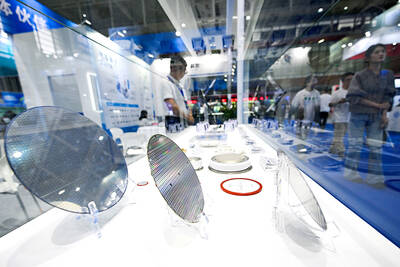Shares of contract chipmaker Powerchip Semiconductor Manufacturing Corp (力積電) yesterday rose by more than 50 percent on its debut on the Taiwan Stock Exchange (TWSE), buoyed by a rosy outlook for the pure-play wafer foundry industry amid tight global supply, dealers said.
Shares of Powerchip Semiconductor closed at NT$75.90, up 52.1 percent from its issuance price of NT$49.90, helping offset the impact on the local market of US market losses on Friday, when the tech-heavy NASDAQ lost 1.92 percent and the Dow Jones Industrial Average declined 0.17 percent due to disappointing US jobs data, dealers said.
Newly listed stock in Taiwan is not restricted by the maximum daily increase or decrease of 10 percent during its first five trading sessions.

Photo: Grace Hung, Taipei Times
Soon after the local equity market opened, Powerchip Semiconductor’s stock price rose 56.31 percent. Its strong showing continued until the end of the session, as investors took their cues from the company’s strong bottom line in the first nine months of this year.
In the first nine months, Powerchip Semiconductor posted a record NT$9.89 billion in net profit, with earnings per share (EPS) of NT$3.07.
Analysts expect its EPS for the whole year to hit NT$4.50 on the back of a robust fourth quarter.
Powerchip Semiconductor generated NT$58.75 billion (US$2.12 billion) in consolidated sales for the first 11 months, up 40.76 percent year-on-year, because the global market did not have enough supply to meet demand.
Powerchip Semiconductor, one of four contract chipmakers in Taiwan, specializes in mature technologies. It owns two 8-inch wafer fabs with a monthly capacity of 110,000 units and three 12-inch wafer plants with a monthly capacity of 110,000 units.
The other three contract chipmakers are Taiwan Semiconductor Manufacturing Co (TSMC, 台積電) — the world’s largest with a share of more than 50 percent of the global market — United Microelectronics Corp (UMC, 聯電) and Vanguard International Semiconductor Corp (世界先進).
Powerchip Semiconductor is the sixth-largest contract chipmaker in the world and the third-largest in Taiwan after TSMC and UMC, company chairman Frank Huang (黃崇仁) said at its initial public offering (IPO) ceremony yesterday.
Huang said he has high hopes that Powerchip Semiconductor will soon become the fifth-largest contract chipmaker in the world, citing orders that the company has secured.
Powerchip Semiconductor’s predecessor was Powerchip Technology Corp (力晶科技), a DRAM supplier that experienced heavy losses in a DRAM cyclical downturn in 2012. Huang was the company’s chief executive officer.
The DRAM maker sold its assets to US-based Micron Technology Inc and delisted from the TWSE in December 2012.
Huang oversaw the restructuring of Powerchip Technology, which transformed into a pure-play wafer foundry business that produced driver ICs for flat panels, imaging processors and power management chips, enabling it to repay its bank loan of NT$120 billion and turn a profit.
Powerchip Technology then spun off its pure-play wafer foundry business, which became Powerchip Semiconductor.
According to the contract chipmaker, its major clients have rushed to sign long-term contracts to secure supplies and deflect the impact of the current supply shortage.
The TWSE said that Powerchip Semiconductor’s robust showing resulted in its market capitalization hitting NT$258.82 billion, the highest figure among all firms that have launched an IPO on the main board in the past three years.
Through the IPO, the company has raised enough to build its planned NT$100 billion plant in Miaoli County, Huang said.

OpenAI has warned US lawmakers that its Chinese rival DeepSeek (深度求索) is using unfair and increasingly sophisticated methods to extract results from leading US artificial intelligence (AI) models to train the next generation of its breakthrough R1 chatbot, a memo reviewed by Bloomberg News showed. In the memo, sent on Thursday to the US House of Representatives Select Committee on China, OpenAI said that DeepSeek had used so-called distillation techniques as part of “ongoing efforts to free-ride on the capabilities developed by OpenAI and other US frontier labs.” The company said it had detected “new, obfuscated methods” designed to evade OpenAI’s defenses

NEW IMPORTS: Car dealer PG Union Corp said it would consider introducing US-made models such as the Jeep Grand Cherokee and Stellantis’ RAM 1500 to Taiwan Tesla Taiwan yesterday said that it does not plan to cut its car prices in the wake of Washington and Taipei signing the Agreement on Reciprocal Trade on Thursday to eliminate tariffs on US-made cars. On the other hand, Mercedes-Benz Taiwan said it is planning to lower the price of its five models imported from the US after the zero tariff comes into effect. Tesla in a statement said it has no plan to adjust the prices of the US-made Model 3, Model S and Model X as tariffs are not the only factor the automaker uses to determine pricing policies. Tesla said

China’s top chipmaker has warned that breakaway spending on artificial intelligence (AI) chips is bringing forward years of future demand, raising the risk that some data centers could sit idle. “Companies would love to build 10 years’ worth of data center capacity within one or two years,” Semiconductor Manufacturing International Corp (SMIC, 中芯) cochief executive officer Zhao Haijun (趙海軍) said yesterday on a call with analysts. “As for what exactly these data centers will do, that hasn’t been fully thought through.” Moody’s Ratings projects that AI-related infrastructure investment would exceed US$3 trillion over the next five years, as developers pour eye-watering sums

Australian singer Kylie Minogue says “nothing compares” to performing live, but becoming an international wine magnate in under six years has been quite a thrill for the Spinning Around star. Minogue launched her first own-label wine in 2020 in partnership with celebrity drinks expert Paul Schaafsma, starting with a basic rose but quickly expanding to include sparkling, no-alcohol and premium rose offerings. The actress and singer has since wracked up sales of around 25 million bottles, with her carefully branded products pitched at low-to mid-range prices in dozens of countries. Britain, Australia and the United States are the biggest markets. “Nothing compares to performing